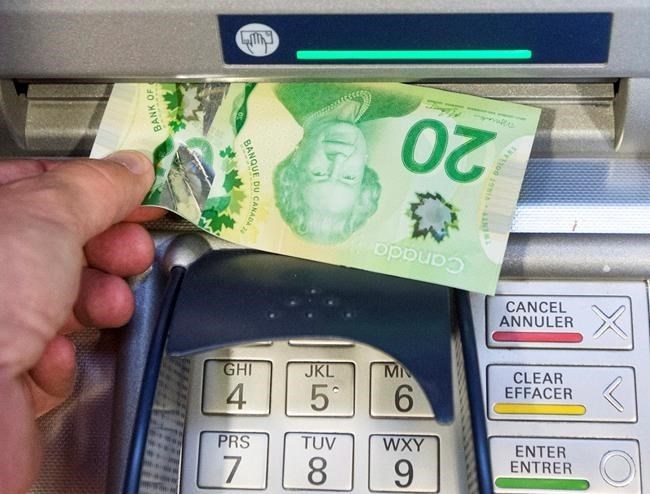
Money is removed from a bank machine in Montreal on May 30, 2016. A new report by Canada's central bank says Canadians favour cash payments over digital ones, especially for smaller sums of money. The Bank of Canada report, based on two surveys conducted by the bank in 2015 and 2013, found 51 per cent of transactions were made in cash in 2015, with debit cards coming next at 31 per cent and credit cards last at 19 per cent.
Image Credit: THE CANADIAN PRESS/Ryan Remiorz
November 17, 2017 - 9:00 AM
VANCOUVER - In an increasingly digital world, most Canadians still carry physical money in their wallets and favour cash payments, especially for smaller sums, according to a new report by Canada's central bank.
However, the report cautions cash could eventually be replaced by continued innovations in payment methods.
"As merchant acceptance of contactless payments increases, consumers may use their debit and credit cards more frequently, accelerating the decline in the use of cash," read the Bank of Canada report, which is based on two surveys conducted in 2015 and 2013.
In 2015, cash payments made up the majority of transactions at 51 per cent, it said.
Debit cards held the second greatest share of transactions at 31 per cent with credit cards falling last at 19 per cent.
Nearly all small businesses (94 per cent) and large ones (98 per cent) accept cash, according to the report.
However, consumers seem to rely on physical money for the smallest purchases, with the median amount of a cash transaction valued at $8.04. Debit and credit card transactions are higher at $28.33 and $43.85 respectively.
Most merchants seem to prefer cash and debit card payments, the report found, as they are less costly to accept than credit cards. Only two-thirds of small- and medium-sized businesses accept debit and credit cards, it said, while nearly all large businesses do.
For some of the smaller and medium companies, transaction costs may be higher than benefits, the report pointed out, so they may decide to not accept cards or only do so for larger purchases.
In 2014, it cost Canadian merchants $10 billion to accept payments with $6.2 billion of that incurred for credit card payments.
The Retail Council of Canada has been lobbying for lower credit card fees for merchants. The industry association says interchange fees in Canada are much higher than what the same companies charge in other markets.
But while cash remains a top choice for Canadians for now, the report notes current innovations in retail payments, like contactless cards, and future ones are likely to compete with cash and even replace it.
Some Canadian businesses, like Ottawa restaurant Mad Radish, already choose not to accept cash payments arguing digital-only transactions speed up service and free up staff.
During the third quarter of 2017, payment processor Moneris Solutions Corp. data showed contactless payments continued to rise in Canada with a 48.35 per cent increase in contactless transaction from the same time last year.
The company has predicted cash payments will make up only one-tenth of all money spent in the country by 2030.
Follow @AleksSagan on Twitter.
News from © The Canadian Press, 2017